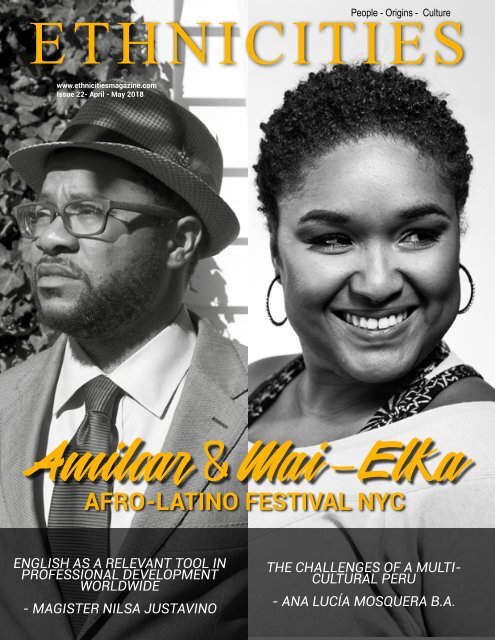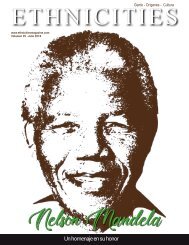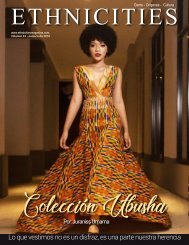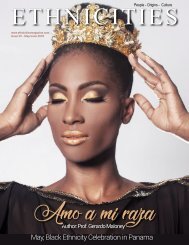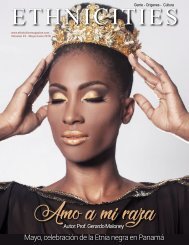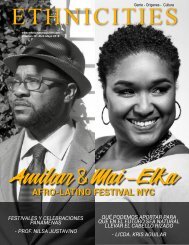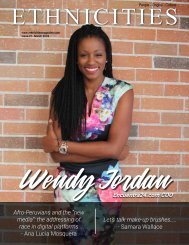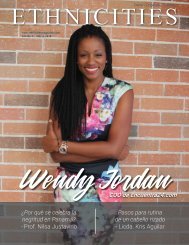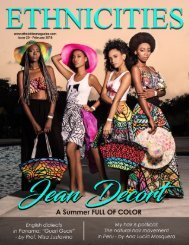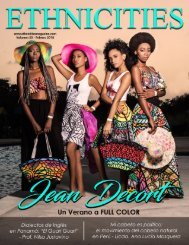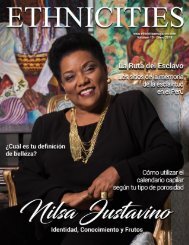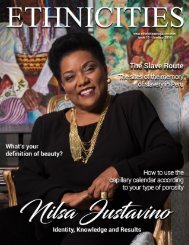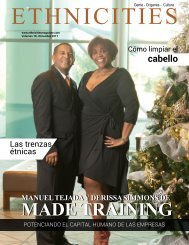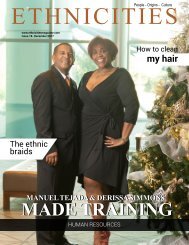Ethnicities Magazine_Abril-Mayo 2018_Volumen_22_English
Create successful ePaper yourself
Turn your PDF publications into a flip-book with our unique Google optimized e-Paper software.
People - Origins - Culture<br />
ETHNICITIES<br />
www.ethnicitiesmagazine.com<br />
Issue <strong>22</strong>- April - May <strong>2018</strong><br />
Amilcar & Mai-Elka<br />
AFRO-LATINO FESTIVAL NYC<br />
ENGLISH AS A RELEVANT TOOL IN<br />
PROFESSIONAL DEVELOPMENT<br />
WORLDWIDE<br />
- MAGISTER NILSA JUSTAVINO<br />
THE CHALLENGES OF A MULTI-<br />
CULTURAL PERU<br />
- ANA LUCÍA MOSQUERA B.A.
¡tú anuncio puede<br />
estar aquí!<br />
Para mayor información<br />
contáctenos a:<br />
info@ethnicitiesmagazine.com<br />
www.ethnicitiesmagazine.com<br />
Síguenos en:
CONTENT<br />
ETHNICITIES<br />
Editorial Letter<br />
Keila Salazar de Moreno, B.A.<br />
<strong>English</strong> as a relevant tool in professional develpment<br />
worldwide................................................................................4<br />
Magister, Nilsa Justavino<br />
The Challenges of a Multicultural Peru......................10<br />
Ana Lucía Mosquera, B.A.<br />
4<br />
FOUNDER & EDITOR IN CHIEF<br />
Keila Salazar de Moreno, B.A.<br />
info@ethnicitiesmagazine.com<br />
ASSOCIATE EDITOR AND COLLABORATOR<br />
Judith Rapley, M.S.W.<br />
judith@judithrapley.com<br />
GRAPHIC DESIGN<br />
Stephany Salazar, B.A.<br />
stephany.salazar20@gmail.com<br />
EDITORIAL LETTER<br />
Lil Taitt– Entrevista............................................................19<br />
<strong>Ethnicities</strong> <strong>Magazine</strong><br />
Mai-Elka y Amilcar - Afro-Latino Festival NYC<br />
Interview................................................................................23<br />
<strong>Ethnicities</strong> <strong>Magazine</strong><br />
Leonela Martínez– Interview.........................................24<br />
<strong>Ethnicities</strong> <strong>Magazine</strong><br />
Let’s talk about nude lipstick.........................................30<br />
Samara Wallace, B.A.<br />
What is to be spiritual? A step to Inner Evolutio.....33<br />
Jessica Bernard, B.A.<br />
Important Announcements...........................................35<br />
<strong>Ethnicities</strong> <strong>Magazine</strong><br />
Events...................................................................................38<br />
<strong>Ethnicities</strong> <strong>Magazine</strong><br />
ENGLISH AS A<br />
RELEVANT TOOL.<br />
13<br />
THE CHALLENGES OF A<br />
MULTICULTURAL PERU<br />
PHOTOGRAPHS<br />
www.pixbay.com<br />
Courtesy of Afro Latino NYC Festival<br />
Cristina Lombana<br />
COVER AND INTERVIEW CONTENT<br />
PHOTOGRAPHS<br />
Courtesy of Afro Latino NYC Festival<br />
APRIL WRITERS<br />
Magister, Nilsa Justavino<br />
Ana Lucía Mosquera, B.A.<br />
Samara Catherine Wallace N., B.A.<br />
Jessica Bernard, B.A.<br />
Keila Salazar de Moreno, B.A.<br />
SALES, MARKETING AND PUBLIC<br />
RELATIONS<br />
Keila Salazar de Moreno, B.A.<br />
SPANISH VERSION CORRECTION<br />
Keila Salazar de Moreno, B.A.<br />
Stephany Salazar, B.A.<br />
ENGLISH VERSION CORRECTION<br />
Judith Rapley, M.S.W.<br />
WEBMASTER<br />
Keila Salazar de Moreno, B.A.<br />
www.ethnicitiesmagazine.com<br />
CONTACT<br />
+507 62523175<br />
Dear readers, we thank you for joining us in this adventure and we hope<br />
you will be completely pleased with the content that we bring thanks to our<br />
different collaborators for this edition # <strong>22</strong> of <strong>Ethnicities</strong> <strong>Magazine</strong>.<br />
For this month as you may have noticed, we have delayed a bit the output<br />
of this edition, but we had strong reasons for doing so, we wanted to include<br />
the as most activities as we could that will take place in Panama during<br />
the month of May, in which Black Ethnicity is celebrated, as in other sister<br />
countries in Latin America.<br />
This month the content is very diverse, we bring you 3 interviews, between<br />
them you will find the interview we did to Mai-Elka and Amilcar of the<br />
Afro Latino Festival of New York founded initially by Dr. George Priestley,<br />
Afro-Panamanian leader, and they are both Afro-Panamanian figures, so<br />
if you want to know more about this great festival we invite you to take a<br />
look into this one. We also interviewed Leonela Martinez, current Queen of<br />
the Black Ethnicity Panama West of the Immaculate Conception Church,<br />
by the way, they will be choosing their queen for this year <strong>2018</strong> on May 26,<br />
so if you are 18 years old or more, you can participate. And we also bring<br />
the interview we did to Lil Taitt, a young exponent of the Panamanian rap<br />
genre, very promising, with lyrics that carry a message of change and life.<br />
Find very interesting topics such as: <strong>English</strong> as a Relevant Tool in Professional<br />
Development Worldwide by Prof. Nilsa Justavino, What is to be spiritual?<br />
A Step to Inner Evolution by Jessica Bernard, The challenges of a<br />
multicultural Peru by Ana Lucía Mosquera, and Nude Lips by Samara Wallace.<br />
In our events section find details about the 3rd Encounter of the Youth<br />
Afro Panamanian Network and Pollera Conga Festival.<br />
I leave you with this edition that like every month, we work especially for all<br />
of you.<br />
With love,<br />
**<strong>Ethnicities</strong> <strong>Magazine</strong> investigates the seriousness of their advertisers,<br />
but i not responsible with related offers they do. The<br />
opinions expressed by the authors do not necessarily reflect the<br />
position of editor of the publication, total or partial reproduction<br />
of the content and images of the publication without prior authorization<br />
of <strong>Ethnicities</strong> <strong>Magazine</strong> is strictly prohibited.<br />
23<br />
MAI-ELKA Y AMILCAR<br />
AFRO-LATINO FESTIVAL NYC<br />
Keila Salazar de Moreno<br />
Presidenta y Editora en Jefe<br />
<strong>Ethnicities</strong> <strong>Magazine</strong><br />
1 2
AFRO PANAMANIANS<br />
ETHNICITIES<br />
ENGLISH AS A RELEVANT TOOL IN<br />
PROFESSIONAL DEVELOPMENT WORLDWIDE<br />
BY: MAGISTER, NILSA JUSTAVINO DE LOPEZ<br />
In linguistics, the discipline studying the nature<br />
of language, a lingua franca is a language<br />
form adapted for the common understanding<br />
among many other languages in<br />
mutual exchange. Accepting this language<br />
form as universal comes as an agreement or<br />
by political reasons. For example, Greek and<br />
Latin were for the most part the language of<br />
the ancient world and for most of the Western<br />
civilization, Latin became the language<br />
of religion, law and protocol; in a similar instance,<br />
that was the case of Russian for the<br />
Soviet Republics; German for central Europe,<br />
and Portuguese and Spanish throughout the<br />
extension of their respective empires, Hindi<br />
in the Indian subcontinent, Mandarin for the<br />
589 ethnic groups in China and Arabic for<br />
most of the Middle East. Currently, the lingua<br />
franca for culture, economy, technology,<br />
art, cinematography, politics, and geopolitics<br />
is <strong>English</strong>.<br />
From this perspective, <strong>English</strong> as an<br />
adaptable and adoptable language in<br />
every branch of human creativity has become<br />
the work tool, along with technology,<br />
cybernetics, electronics, and the rules<br />
of business, marketing and multimodal<br />
transportation.<br />
In linguistic terms, <strong>English</strong> produces an<br />
average 1000 words per day among the<br />
different disciplines of human ingeniosity:<br />
industry, technology, cinema, television,<br />
politics and social events—through<br />
the methods of coinage, blending,<br />
borrowing of foreign words, acronyms<br />
(the creation of words by the initials of a<br />
major concept), idioms, street and ethnic<br />
talk, and professional jargon. From these<br />
words, experts claim that around 300<br />
remain in the common lexicon and half<br />
get to the dictionary. The others are seasonal,<br />
trendy, and they disappear in oblivion<br />
with time. This flexibility and creativity<br />
account for the number of mixed<br />
dialects or pidgins that have emerged<br />
in the last 30 years around the world:<br />
Frenglish, Italglish, Chinglish (Chinese),<br />
Greeklish (Greek) , Danglish (Danish),<br />
Porglish (Portuguese), Taglish,(tagalog)<br />
Norwenglish (Norwegian) , Runglish<br />
(Russian) and In Latin America and Panama—Spanglish.<br />
Samples of Panamanian Spanglish—<br />
chateamos, esmarfornizamos, luqueamos.<br />
We have friqueo, chilin, grubear,<br />
llamar para atrás, and we scream “si un<br />
man nos yopea el raid” . Identlical situations<br />
extend wide and at large around a<br />
planet that for a long time now, ceased<br />
to be compartmentalized and has been<br />
reduced to nanoseconds of information,<br />
thanks to technology and satellite communication.<br />
Long dissertations about the benefits of<br />
the language are quite redundant because<br />
we know all the recommendations,<br />
suggestions, and limitations imposed on<br />
new professionals looking for job opportunities.<br />
We all know that this country<br />
has been permanently a transit, traffic,<br />
and trade area way back since colonial<br />
times…and as such, it requires a broad<br />
vision and a great capacity for adaptability<br />
for survival.<br />
It was no coincidence, that although<br />
ETHNICITIES<br />
Christopher Columbus was the first to<br />
set foot in Panama—or better yet, Bocas<br />
del Toro—in 1501, it is Vasco Nuñez de<br />
Balboa who takes the accolades for the<br />
discovery of the Pacific Ocean in 1513,<br />
simply because his feat discovered the<br />
route towards gold and riches in America.<br />
As a melting pot, Panama embraces<br />
foreigners and natives who speak quite<br />
a number of different languages. In an<br />
economy dependent on tourism, on the<br />
transportation of goods, in communications,<br />
in business and service, <strong>English</strong> is<br />
the unavoidable element for the future<br />
of a country currently living an unprecedented<br />
economic success, and facing a<br />
new era of growth and development.<br />
In 1914, when the Panama Canal was<br />
inaugurated, Panama was a newborn republic;<br />
the others in the area were almost<br />
100 years old by the time we became a<br />
real self-governed nation. Regardless of<br />
political aspects, the Canal at the time<br />
determined the economic path of the<br />
new country and our tradition of business<br />
and services again took the preeminence<br />
it had lost while it was a Colombian<br />
department. We had to run faster to<br />
get in tune with the other Latin American<br />
nations; and we literally jumped over the<br />
hurdles to reach the goal. The economic<br />
development of this country makes us<br />
different from our Latin American neighbors,<br />
and today, we hold quite a desirable<br />
position in the hemisphere. In addition,<br />
we have, we do have a dollar economy,<br />
and that makes us strong.<br />
With the widening of the Canal in 2015,<br />
exactly 100 years after the advent of the<br />
first Canal, the forecast of a similar economic<br />
boom as that in the 20th century<br />
goes beyond the next 50 years or more.<br />
We need to stop driving with parking lights<br />
and turn on our halogen beams and<br />
look ahead towards the confines of the<br />
road. The mere fact that the widening<br />
works have brought in people from all<br />
3 4
AFRO PANAMANIANS<br />
ETHNICITIES<br />
over the world, demands a need for bilingual<br />
personnel and staff, everywhere—<br />
from the chauffer and the nanny to the<br />
floor manager and the CEO. <strong>English</strong> IS<br />
the language to be spoken. Not Mandarin.<br />
Even the Chinese got wise and learned<br />
<strong>English</strong> rather than Mandarin…We<br />
just need to look at the economic success<br />
in China TODAY.<br />
Concurrently, many doors and opportunities<br />
have been made available in the<br />
last 40 years, and many Panamanians<br />
have studied in Asia, China, Japan, Europe,<br />
the United States, and the British<br />
Commonwealth. Cultural, academic,<br />
scientific, and technological exchange<br />
has been brought about; for example, in<br />
this university academic and research<br />
agreements have been made with the<br />
United States and other countries; the<br />
Fulbright scholarships, the scholarships<br />
and endowments by several embassies,<br />
all the universities at City of Knowledge…<br />
all of which somehow have a basic requirement—the<br />
applicant HAS to speak<br />
<strong>English</strong>.<br />
And this is true around the world, a wide<br />
variety of International treaties and<br />
agreements of political coexistence,<br />
cooperation, support, assistance in every<br />
area--health, business, industry, construction,<br />
even sports—engage not only<br />
governments, but also their people within<br />
the conditions and requirements—and in<br />
order to overcome language barriers—<br />
<strong>English</strong> has become the object, the tool,<br />
the means to achieve these agreements.<br />
It is not anymore a matter of sovereignty,<br />
imperialism, domination—no. It is being<br />
practical and intelligent. The Lingua<br />
franca becomes a means to facilitate,<br />
to break barriers, to make opportunities<br />
available—it is a flexible, useful and efficient<br />
tool.<br />
So what do we have to do, then? Join in,<br />
adapt, get ready and get really ready for<br />
real competition, for success, for achievements.<br />
We pursue college degrees to<br />
satisfy needs, wishes, and dreams, to<br />
set the basis for our future. For a better<br />
chance than that our parents could<br />
afford for us, or whoever was responsible<br />
for our academic growth. When we<br />
go to the jungle, we carry all the gear we<br />
need for the trip. In our own Panamanian<br />
vernacular: Si vas al monte, lleva<br />
machete.” We cannot afford being surprised<br />
for lack of caution. We need the<br />
unexpendable tool—we need to speak<br />
<strong>English</strong>. (Not just mumble, or stumble in<br />
<strong>English</strong>—really speak <strong>English</strong> well)<br />
We cannot be left behind for a whim, for<br />
ignorance, for lack of interest or worse,<br />
for a lack of vision of the future. THE FU-<br />
TURE IS HERE. The Panama we dreamt<br />
of is here. And you, the future of the next<br />
50 years have to follow the dream, make<br />
it bigger, larger, richer, better, and make it<br />
available for the Panamanians that you<br />
will produce and who will run the next 50<br />
years to 2114.<br />
Now, I want to share with you, among<br />
facts and figures lived throughout my 43<br />
years as an <strong>English</strong> teacher, an experience<br />
concerning the relevance of speaking<br />
<strong>English</strong> as the most important qualification<br />
for a job today and in the future in<br />
Panama, without putting aside the value<br />
of our own culture.<br />
My life has been blessed with many<br />
opportunities—one of those was working<br />
at Panama Canal Commission, ACP<br />
today. In 2007, I was entrusted the job<br />
of interviewing Panamanian professionals—in<br />
the maritime area and other<br />
fields, for 10 managerial positions and<br />
15 other for pilots in the Canal, for the<br />
mule operators who guide the ships in<br />
the locks, and for port-entry coordinators.<br />
The Authority selects, trains this personnel<br />
for a long time before they start on<br />
the position to guarantee the efficient,<br />
100 percent free transit of a ship in the<br />
Canal. This process of interviewing took<br />
6 months.<br />
Every Friday from June to December that<br />
year, I interviewed an average 15 Panamanian<br />
from Escuela Nautica de Panama,<br />
ages <strong>22</strong> to 39 year old who wanted to<br />
be chosen to work in the great marvel of<br />
the modern world. They came for all over<br />
the world. They first took a written test,<br />
and then came to the interview, which<br />
score in the end, would determine their<br />
entry to the position or their rejection. I<br />
interviewed Panamanians from Chitre,<br />
Veraguas, los Santos, Bocas del Toro,<br />
Colon, from the City of Panama, from Darien---different<br />
social levels, from remote<br />
areas in Panamá. Sometimes, the names<br />
of these places where they had been<br />
born were lessons in geography for me,<br />
ETHNICITIES<br />
since I didn´t have a clue that these places<br />
existed. The interview was a 10 run<br />
to evaluate their oral and listening skills.<br />
It was a conversation where they talked<br />
about their experiences as sailors, deck<br />
officers, engineers, machinists; in other<br />
words, their work at sea. I spoke quite<br />
amenably with Panamanians of humble<br />
origins who told me of their long trips in<br />
cargo ships, in bunker transport vessels,<br />
research vessels, marine research ships,<br />
bathyscaphes, ferries, launches, yachts,<br />
catamarans. I talked to Panamanians<br />
who had works in Qatar, Singapore, Pakistan,<br />
Sri-Lanka, Canada, Australia, Terra<br />
Nova, Ireland, Scotland, Patagonia,<br />
Mozambique, practically all and every<br />
unexpected place in the world. They told<br />
me of their fears, their loneliness when<br />
they started on their first ship where no-<br />
5 6
ETHNICITIES<br />
AFRO PANAMANIANS<br />
body spoke a Word of Spanish, ironically<br />
though, because the ship carried a Panamanian<br />
flag.<br />
They told me how the basic classes attended<br />
in school had been their lifesaver<br />
in ships filled with Chinese, Malaysians,<br />
Phillipino, Greek, Turkish, and how they<br />
had managed to survive. And I sat there,<br />
taking notes, looking at them, evaluating<br />
their performance according to preset<br />
rubrics, and I thought to myself, filled with<br />
a pride I had to hide as an interviewer. It<br />
was difficult though, because my pride<br />
to hear these “panameñitos, vida mía”<br />
to flow, tell, make jokes and speak in a<br />
language that ranged from good to excellent…they<br />
spoke <strong>English</strong> like music to<br />
my ears, proficiently, telling me their stories<br />
at sea, some quite difficult and scary<br />
for someone who can´t swim in a baby´s<br />
pool. AND I WAS PROUD THAT I CHOSE<br />
TO BE AN ENGLISH TEACHER. O YES.<br />
Likewise, for the management positions,<br />
I interviewed many Panamanians who<br />
worked at local banks, law firms, in government<br />
posts, who came in with Master´s<br />
degrees, PhD’s, graduate studies<br />
and all other academic paraphernalia…<br />
who stammered, did not answer, kept<br />
quiet or rather signed an affidavit waiving<br />
all responsibility on the Authority for<br />
their refusal to take the interview. THEY<br />
COULD NOT SPEAK ENGLISH.<br />
Some, but not to many, struggled to<br />
communicate; a very low percentage of<br />
the total interviewees had an adequate<br />
mastery of the language. These could<br />
go on to the next step. At times, deep inside<br />
I felt sorry for these applicants, who<br />
in spite of their academic achievement<br />
would not be able to fulfill a dream. A<br />
couple even asked why they had to take<br />
a test in <strong>English</strong> if the Canal was Panamanian.<br />
And I would answer,” We offer<br />
service to our customers, and our customers<br />
do not speak Spanish, but they do<br />
<strong>English</strong>”, yes, the Canal is ours, but our<br />
services have to be delivered in the Lingua<br />
Franca.<br />
For you, who come through this University<br />
to get a degree in <strong>English</strong>, to become<br />
teachers, hopefully, I hope this little experience<br />
of mine gives you a message. We<br />
are not in the classroom to teach books,<br />
or teach the intricate world of transformational<br />
grammar, or the difference between<br />
a schwa and a fricative sound in<br />
<strong>English</strong>. We are in the classroom to take<br />
a challenge, to take a child by the hand,<br />
and teach him how to change his whole<br />
linguistic knowledge to be able to acquire<br />
another. We are not in the classroom<br />
to teach 6 or 10 chapters of a book a<br />
year, and teach the same thing year after<br />
year after year---from preschool to 12th<br />
grade—the verb to be, the irregular verbs,<br />
the pronouns, there is, there are, do, did<br />
not and does, and maybe, just maybe the<br />
future with will.<br />
We are in the classroom to make Panamanians<br />
capable to think, to understand,<br />
and communicate in <strong>English</strong> so that they<br />
are able, like those interviewees I met, to<br />
get an education, to go abroad, to have a<br />
tool to help them get jobs for their future…for<br />
the next 50 years along with you,<br />
and to build the next 50 years to 2015 for<br />
their children.<br />
At the end of the day, I hope that when<br />
another interviewer like me, has to engage<br />
in a conversation with one of you<br />
for a position in the future, or one of your<br />
students, she might feel as proud as I felt<br />
interviewing my fellowmen, proud of being<br />
bilingual, proud of having passed on<br />
to others the tool for success: that they<br />
can and they do speak <strong>English</strong>. Thank<br />
you.<br />
7 8
THE CHALLENGES<br />
OF A<br />
MULTICULTURAL<br />
PERU<br />
¡tú anuncio puede<br />
estar aquí!<br />
BY: ANA LUCIA MOSQUERA, B.A.<br />
Para mayor información<br />
contáctenos a:<br />
info@ethnicitiesmagazine.com<br />
www.ethnicitiesmagazine.com<br />
Síguenos en:<br />
Peru conducts the first specialized<br />
survey on issues of cultural<br />
diversity and perceptions of racial<br />
discrimination.<br />
Peru is an immensely diverse<br />
country. However, the country still<br />
faces great challenges for the positive<br />
assessment of this diversity<br />
and the elimination of racial discrimination;<br />
and this challenge<br />
has been taken on by government<br />
agencies that, along with civil society<br />
organizations and other relevant<br />
actors, dedicate their efforts<br />
to making this problem visible<br />
and working to find solutions that<br />
contribute to the construction of<br />
a society in which differences are<br />
not an obstacle to development<br />
with equal opportunities.<br />
With this in mind, one of the first steps is<br />
to identify the state of the issue. It is necessary<br />
to know how Peruvians and Peruvians<br />
perceive different ethnic and linguistic<br />
groups and how they relate to and<br />
interact with others. For this reason, the<br />
Ministry of Culture of Peru and Ipsos Peru<br />
came together to design and implement<br />
the National Survey on Perceptions and<br />
Attitudes on Cultural Diversity and Racial<br />
Discrimination.<br />
This survey is important for many reasons,<br />
but the most important is related to<br />
the public-private partnership to address<br />
important social issues and collect information<br />
for the development of public policies<br />
aimed at the recognition of cultural<br />
diversity that contribute to the elimination<br />
of racial discrimination, since this survey<br />
provides, for the first time in the history of<br />
10
AFRO-PERUVIAN MOVEMENT<br />
ETHNICITIES<br />
the country, real and statistically valid indicators<br />
on this problem that affects Peruvian<br />
society.<br />
The results of the study confirm this:<br />
more than 50% of the people surveyed<br />
consider that Peruvians are racist or very<br />
racist, more than half of Peruvians have<br />
felt something discriminated against, discriminated<br />
against or very discriminated;<br />
and of this figure, 28% felt discriminated<br />
by their skin color and 17% by their facial<br />
or physical features. Likewise, the places<br />
in which they are exposed to experiencing<br />
greater discrimination are public hospitals<br />
or medical posts (<strong>22</strong>%), commissariats<br />
(19%) and municipalities (14%), evidencing<br />
that the highest percentage of cases<br />
of discrimination are generated in entities<br />
of the State.<br />
nation are focused on skin color, physical<br />
features and the prevalence of stereotypes<br />
that commonly associate them with<br />
delinquency and criminality. In this same<br />
line, the results indicate that the Afro-Peruvian<br />
population is underrepresented in<br />
the highest socioeconomic levels, thus<br />
evidencing their situation of vulnerability.<br />
The survey provides information on perceptions<br />
of discrimination also addressing<br />
issues such as interracial marriages,<br />
indicating that there is greater rejection of<br />
these in the case that one of the people<br />
is of African descent; and the percentages<br />
of self-identification of the Afro-Peruvian,<br />
indigenous and native populations within<br />
the framework of the National Population<br />
and Housing Census.<br />
Despite showing, mostly negative indicators<br />
on the Afro-Peruvian population, the<br />
results show interesting information regarding<br />
the process of self-identification<br />
of this population, since a percentage higher<br />
than those observed in previous instruments<br />
is clearly observed, which would<br />
indicate that the inclusion of the ethnic<br />
variable would have a greater effect on the<br />
identification of the Afro-Peruvian population.<br />
The results of the survey leave us more<br />
questions than answers. However, this<br />
is an important effort as it contributes to<br />
the continuation of a necessary dialogue<br />
about our differences, and it challenges<br />
us to reevaluate ourselves and continue<br />
rethinking our country in the complexity<br />
of its diversity. This survey should not be<br />
the end, but a starting point for a serious<br />
conversation as a country to deconstruct<br />
our prejudices and build a more inclusive<br />
society.<br />
In addition, the results indicate that the<br />
Afro-Peruvian population is perceived as<br />
the most discriminated population and<br />
that the main reasons for this discrimi-<br />
11 12
ETHNICITIES<br />
ETHNICITIES<br />
LIL TAITT<br />
INTERVIEW<br />
What is your real name, where were<br />
you born and how old are you?<br />
My real name is Alexander Javier Taitt<br />
Hall I was born in Panama City and I’m<br />
28 years old.<br />
Why did you decided to get started<br />
with your musician career?<br />
Well, from an early age I always had that<br />
passion for music, and from age 9 I wrote<br />
my own songs. I did not take it as serious<br />
at that age as I was focused on my studies,<br />
however that passion continued and<br />
I kept writing until one day I said to myself:<br />
“It’s time to stop seeing this as something<br />
normal, it is a gift is a talent and<br />
I must take it seriously, but in a different<br />
way, being different from the others, keeping<br />
certain important principles for me<br />
and making themes that really generate<br />
positive changes in people and that it is<br />
an inspiration to many people”. So then I<br />
decided to form a group starting with my<br />
cousins, who had the same passion.<br />
about me, now they feel very proud and<br />
support me, I have been able to show that<br />
I have a future in this.<br />
I have had to sacrifice a lot of things that<br />
have hurt me, but at the same time they<br />
have been necessary for my musical<br />
growth, certain friendships, also sacrifice<br />
a lot of time that used to dedicate to<br />
many important people in my life, to give<br />
time to what I love, seeing them affected.<br />
I sacrificed job opportunities, money etc.<br />
What is more complicated, the creative<br />
process of an album or touring?<br />
I think if you have a good album that<br />
draws attention, well prepared, that opens<br />
many doors and you have an effective<br />
spearhead to be able to make a musical<br />
tour, however I think the most difficult<br />
thing is the making of the album, since it<br />
takes more time, sacrifice and it must be<br />
something that is truly worthwhile, each<br />
instrumentation, each letter, the concept<br />
of the album, the approach etc.<br />
How has your family’s support been<br />
and what have you had to sacrifice<br />
for your dream?<br />
Even though art and music are generational<br />
in my family, at first they saw what I<br />
was doing as a waste of time, for them<br />
it was more important for me to I finish<br />
my degree, they did not want me to waste<br />
time on studio expenses, recording,<br />
events, because they did not see future,<br />
for them it was like a simple hobby. But<br />
I did not see it that way, for me it was a<br />
great dream<br />
So I struggled twice and continued studying<br />
and at the same time working hard<br />
on my musical projects, until I graduated.<br />
It was like a gift for them and so when I<br />
finally finishes, I was able to concentrate<br />
on what I wanted, music; Little by little, I<br />
have been reaping the rewards and when<br />
they saw that, they changed their opinion<br />
15 14
ETHNICITIES<br />
ETHNICITIES<br />
What do you enjoy most about being<br />
a musician?<br />
Wao! I think everything, from the moment<br />
that inspiration arrives and you begin<br />
to write, to connect with all that you are<br />
passionate about and share it with people<br />
who share your same passion and vision,<br />
in this case my group, the council of<br />
each topic, each events, uff is inexplicable<br />
I LOVE MUSIC.<br />
What other interpreter has been a<br />
source of inspiration for you?<br />
Well I could mention the American artist<br />
LECRAE, he is a different artist who has<br />
reaped many success with a different<br />
musical concept from the others, I can<br />
also mention J COLE and of my land El<br />
Rookie.<br />
Who do you admire of the current<br />
musical environment?<br />
LECRAE.<br />
What message can you leave to our<br />
youth?<br />
That regardless of the situation, always<br />
strive for your dreams and goals, that you<br />
enjoy what you love to do, but above all<br />
that you are passionate about, you can<br />
always do something that generates positive<br />
changes for your nation and your<br />
environment. That they can inspire many<br />
people and that in each decision they can<br />
have GOD as their guide since He will<br />
always know what is best for us.<br />
15<br />
16
ETHNICITIES<br />
AFRO-CHILENOS<br />
15
ETHNICITIES<br />
ETHNICITIES<br />
We want our readers to more about<br />
you ... can you share with us a bit<br />
about you, your origins?<br />
We are Afro-Panamanians Mai-Elka<br />
Prado was born in Panama and Amilcar<br />
Priestley in New York, son of Panamanian<br />
parents. Mai-Elka, the founder and creative<br />
director of the Festival, is a psychologist,<br />
medical translator for social services<br />
in New York and a singer. Amilcar<br />
is a lawyer and director of the non-profit<br />
organization, Afrolatino Project, founded<br />
in 2006 by Dr. George Priestley, Afro-Panamanian<br />
leader.<br />
When and why was the idea of making<br />
an Afro Latino Festival in New<br />
York born?<br />
It is a very interesting and complete<br />
festival: music, gastronomy, photography,<br />
dance and others. It shows<br />
that there is previous experience.<br />
Have you organized other festivals<br />
before?<br />
Since 2010 we are working on events<br />
with Afro-descendant themes. Mai-Elka<br />
was also active in the Afro-Latin music<br />
scene in New York as a singer-songwriter.<br />
In combination with the experience as<br />
entertainment lawyer and director of the<br />
Afrolatin Project we have had the opportunity<br />
to incorporate different elements in<br />
the Festival. We are always learning and<br />
seeing how to improve the experience<br />
and programming.<br />
It was born in 2013 summer due to the<br />
lack of affirmed and recognized community<br />
platforms for Afro-Latinos in New<br />
York. We started on a corner in Brooklyn<br />
for only one day, but we have been fortunate<br />
to grow the fesrival for several days<br />
and components with the support of the<br />
community, our team and organizations<br />
like the Schomburg Center for Black Culture<br />
Research in Harlem, the Blood Center<br />
of New York, the Abrons Art Center in<br />
Manhattan and many more.<br />
MAI-ELKA<br />
& AMILCAR<br />
AFRO-LATINO FESTIVAL NYC<br />
INTERVIEW<br />
As any new project, there must have<br />
been both sweet and difficult moments.<br />
What is it that has encouraged<br />
you to continue in the most<br />
complicated moments?<br />
This it is about keeping and developing<br />
this platform to help in the expansion of<br />
artists, leaders, theorists and activists of<br />
African descent. Our encouragement is<br />
that this has to continue at least until the<br />
end of the Decade 2024 and if God wants<br />
much further.<br />
19 20
PERSONALITIES<br />
ETHNICITIES<br />
What do you want to show the audience<br />
that attends the Afro Latino<br />
Festival?<br />
One of the most important aspects of<br />
which we realize, is the value that the<br />
community gives to the festival. They<br />
want to show their pride. For many it<br />
has a sense of discovery of their culture,<br />
identity or activism and for others a more<br />
a space to become more visible, to meet<br />
and share with others. There is a sense<br />
of community and solidarity that we want<br />
to support through the Festival and the<br />
work we do in general.<br />
¿Cómo se han encargado de proyectar<br />
toda nuestra esencia Africana<br />
a través del festival?<br />
Este año nuestro tema es “Más allá de la<br />
identidad”. El año 2016 nuestro tema era<br />
“Las Vidas Negras Importan”, en 2017<br />
era “Mujeres de la Diáspora”; este año es<br />
“Identidad y Más Allá”. O sea los principios<br />
del Decenio Afro son reconocimiento,<br />
justicia y desarrollo. Estamos poniendo<br />
al frente la importancia de celebrar<br />
nuestra identidad, pero también entender<br />
y analizar qué es lo que esto implica en<br />
el contexto político, socio-económica,<br />
educativo y del medio ambiente. El año<br />
pasado la honorable Susana Baca nos<br />
dijo que hemos logrado mucho, pero hay<br />
mucho más que hacer. La regeneración<br />
de la conciencia negra en esta nueva generación<br />
da mucha fe de que esto va ser<br />
posible.<br />
How have you managed to show<br />
all our African essence through the<br />
festival?<br />
socio-economic, educational and environmental<br />
context. Last year the honorable<br />
Susana Baca told us that we have<br />
achieved a lot, but there is much more to<br />
be done. The regeneration of black consciousness<br />
in this new generation gives<br />
great faith that this will be possible.<br />
For what date are Afro Festival Latino<br />
of New York <strong>2018</strong> scheduled and<br />
what can we expect?<br />
The dates for this year are July 13 to 15 in<br />
several places in New York including Harlem,<br />
the Lower East Side and Brooklyn.<br />
Our conference and awards, the Afrolatin<br />
Talks, will be held on the first day, July 13,<br />
which aims to promote speeches on various<br />
topics of interest in our communities.<br />
There will be presentations on topics<br />
such as discrimination and legal systems<br />
in the Americas and on the Census. We<br />
announce our winners in May.<br />
This year we expanded the Liberation<br />
Film Festival on the second day, July 14.<br />
We have programmed films, documentaries<br />
and short films from more than 10<br />
countries, along with talks and workshops<br />
of the film industry. From Panama<br />
we have several documentaries, one of<br />
them is “Panama Al Brown” by director<br />
Carlos Aguilar. It is the story of the first<br />
boxing world champion of Latin American<br />
/ Latin origin in the world.<br />
We will have the final concert, on July 15,<br />
will be a joy with handicrafts and meals<br />
Afro-Latin, African, Caribbean, vegetarian,<br />
fish and much more. We will announce<br />
the lineup for <strong>2018</strong> on May 5.<br />
What message can you give to our<br />
readers?<br />
We invite all of you to come to the Festival<br />
from July 13 to 15 to see how we celebrate,<br />
educate and affirm representation,<br />
culture, entrepreneurship, activism in the<br />
context of Afro Latinity.<br />
21<br />
The first year the theme was “Beyond<br />
identity”. In 2016 our theme was “The<br />
Black Lives Matter”, in 2017 it was “Women<br />
of the Diaspora”; this year is “Identity<br />
and Beyond”. In other words, the principles<br />
of the Afro Decade are recognition,<br />
justice and development. We are putting<br />
forward the importance of celebrating<br />
our identity, but also understand and<br />
analyze what this implies in the political,<br />
How can our readers contact you?<br />
You can go to the page of us and subscribe<br />
to receive our news, updates and more<br />
information: www.afrolatinofestnyc.com<br />
<strong>22</strong>
AFRO-CHILENOS<br />
ETHNICITIES<br />
LEONELA<br />
MARTÍNEZ<br />
INTERVIEW<br />
24
ETHNICITIES<br />
ETHNICITIES<br />
Who is Leonela, what are your family<br />
roots, where were you born and<br />
grew up?<br />
Leonela is a talented, daring, enterprising<br />
girl, she is full of a spark that makes her<br />
appreciate her virtues and learn from her<br />
failures and there is no doubt that she is<br />
madly in love with God.<br />
My roots, on my mother’s side, are a<br />
combination of Afro-descendant Jamaica<br />
and indigenous Sambú-Darién, on my<br />
father’s side are Indigenous of Garachiné<br />
- Darién and afro-descendants from Colombia<br />
- Jurado.<br />
How and when did you have the idea<br />
to start your business?<br />
At the age of 21, on December 1, 2011, I<br />
decided to conclude what I had been thinking<br />
all the time, start a business where<br />
I cooked and with what little resources I<br />
had, I named it Leo - Mar , Catering (combination<br />
of the beginning of my name<br />
and surname, Leonela Martínez) and with<br />
the vision that it will be one of the best<br />
Catering company in Panama, I drew a<br />
logo, I made a business plan, (learned in<br />
the course of business management of<br />
Ampyme ), I designed my logo, Mission<br />
and Vision. I went from house to house<br />
with fruit sponge cake with liquor so<br />
that my neighbors and whoever I found<br />
would taste it and make an order for Mother’s<br />
Day and Christmas, after delivering<br />
the orders, I gave an anonymous survey,<br />
where they could rate the product.<br />
What personal and professional<br />
support did you receive?<br />
The first personal support I received was<br />
very valuable and unforgettable, with the<br />
financial support of a counselor and guide<br />
person, I was able to obtain the first<br />
necessary supplies to start my project.<br />
Working with Chef Cuquita Arias de Calvo<br />
motivated me in an extraordinary way, her<br />
advice and love have had a lot to do with<br />
the motivation of my projects. My friends,<br />
neighbors, family became the best promotion<br />
and advertising of my business,<br />
and if I need something I’m sure I can<br />
count on them, another professional support<br />
that I had was Ampyme, since they<br />
taught me a lot in a course of Business<br />
management, they gave me an industrial<br />
furnace and I still keep in my mind and<br />
put into practice many of the lessons I<br />
learned.<br />
Did you make a business plan before<br />
you started?<br />
My Business Plan I owe to the example and advice<br />
of my entrepreneurial parents, the business management<br />
and marketing class of my secondary<br />
school San Martin de Porras, the Culinary Arts studies<br />
at the Interamerican University of Panama, the<br />
business management course of Ampyme, without<br />
all this it would not be possible to know so much<br />
valuable information to begin my entrepreneurship.<br />
25 26
What cost you the most when starting<br />
your project?<br />
The organization, managing time and<br />
money, was very difficult for me since I<br />
must confess that I have never been organized,<br />
planned, ordered and punctual. I<br />
owe it to my enterprise and to the blows<br />
that I have given to learn, that with the<br />
absence of all these characteristics it is<br />
impossible to reach the goal.<br />
What platforms do you use to promote<br />
your business and to communicate<br />
with your customers?<br />
Facebook, Instagram, whatssap in communication,<br />
dissemination of information<br />
and advertising of my products to my<br />
clients and potential clients, it has helped<br />
me a lot.<br />
If you were to start over, would you<br />
change anything?<br />
I am a faithful believer that what one happened<br />
in the past is what had to happen,<br />
in order to be where I am and to be where<br />
I am going to be in the future. God’s plan<br />
is perfect.<br />
Of all the products that you offer,<br />
which one do you enjoy the most<br />
when it comes to making it?<br />
All those who carry processes, details<br />
and natural ingredients, the simpler the<br />
more beautiful. Little and unforgettable<br />
people fall in love with it, I love those that<br />
tell stories, those that are full of beautiful<br />
feelings, that transmit emotions. Definitely<br />
all events are very special, birth,<br />
wedding, birthday, graduation, among<br />
many more occasions to celebrate that<br />
they can exist, everything is extremely<br />
important, especially the food that feeds<br />
the soul, from the mouths, the food , the<br />
bakery should always give of what to talk,<br />
my mission is to make them smile, sigh<br />
and never forget that feeling in sight and<br />
then on your palate.<br />
* A lot of effort.<br />
ETHNICITIES<br />
Reflections and recommendations<br />
to Entrepreneurs.<br />
* Listen to audios, watch videos, read tips<br />
for entrepreneurs, learn!<br />
* Study the most you can in emotional<br />
intelligence, if you do not have control of<br />
yourself, you cannot control anything!<br />
* Follow successful people in your social<br />
networks, positive people. Motivate yourself!<br />
* Negative comments will always have,<br />
use them as gasoline to keep going!<br />
* If you do not trust your decisions, you<br />
transmit insecurity and nobody wants a<br />
product or service that emanates insecurity.<br />
Believe in yourself!<br />
* Every time I go through a mirror and see<br />
my reflection, I tell myself I LOVE ME, I<br />
ACCEPT, I FORGIVE AND I AM DESERVE<br />
OF .... (WHAT YOU WANT HERE). This has<br />
helped me a lot to strengthen my self-esteem,<br />
I recommend them. To undertake<br />
self-love is too important, good self-esteem.<br />
* Do not despair, be patient, do not compare<br />
yourself. Your time is not the same<br />
as anyone’s. GOD’S TIME IS PERFECT.<br />
** I wish you great success in everything<br />
good you undertake **<br />
Where are they located, in what networks<br />
can they follow you and how<br />
can they place orders?<br />
We are located in La Chorrera, Las Lomas,<br />
Calle Flores, house # 250.<br />
In social networks:<br />
Instagram: @Leomarcatering, @Leohealthy_<br />
Facebook: Leomar Catering<br />
Whatsapp: 65477133<br />
28
LET’S TALK<br />
NUDE LIPSTICK<br />
BY: SAMARA CATHERINE WALLACE-NOYOLA, B.A.<br />
Are you a woman of medium and/or<br />
deep skin tone who would like to wear<br />
nude lipstick, but are certain that if you<br />
wore it you’d look intoxicated or like<br />
you’ve just eaten a white powdered<br />
donut? Do you feel like these shades<br />
cannot possibly complement your<br />
skin tone? I too have felt this way. As<br />
a woman of dark complexion, with<br />
an uneven lip tone, I would only wear<br />
lipstick that was much darker than my<br />
lips; typically, dark brown or burgundy,<br />
wishing that I could pull off a nude<br />
lipstick. Nevertheless, my makeup<br />
remained the same until I learned of<br />
tricks to wear (almost) any lip shade--even<br />
these trendy nudes! In this<br />
edition of Beauty Express, we want to<br />
share our “Black Girls hack to wearing<br />
nude lipstick”.<br />
Nude lipsticks are generally understood<br />
as being a flesh toned shade that<br />
30
BEAUTY EXPRESS<br />
ETHNICITIES<br />
mimics the color of a person’s natural<br />
lips or it can simply be a neutral shade.<br />
These shades are usually a variation<br />
of brown, pink and/or coral.<br />
Wearing nude lipstick is a great way to<br />
wear the “no makeup, makeup” look.<br />
This trend is a light makeup application<br />
where the makeup is so natural looking<br />
that you cannot tell if she is wearing<br />
any or if she just has phenomenal<br />
skin and is well put together. Nude lips<br />
can also be a subtle way to enhance<br />
or highlight another facial feature. For<br />
example, if you want to make your eye<br />
makeup pop with a smokey eye as the<br />
main attraction of your makeup look,<br />
pairing it with a nude lipstick will allow<br />
the eye to stand out. Wearing a dark<br />
or bright lipstick with the smokey eye<br />
could cause the features to compete,<br />
and that’s ok if that’s the look you are<br />
going for. Remember makeup is a personal<br />
expression of your unique style;<br />
wear it how you feel best. These are<br />
simply guidelines and suggestions for<br />
certain trends.<br />
In true Beauty Express fashion, we<br />
know that before any application of<br />
makeup, we must prepare the skin.<br />
The same goes for lipstick. Before<br />
applying our lipstick, we must take the<br />
time to prepare our lips to ensure a<br />
flawless application.<br />
Lip Preparation Steps<br />
Step 1<br />
-Use a soft baby toothbrush to exfoliate<br />
your lips. Apply a heavy amount lip balm,<br />
brush lips gently and wipe.<br />
Step 2<br />
Hydrate: Before applying lipstick, lips<br />
should be lightly moisturized with lip<br />
balm to maintain smoothness and keep<br />
your lips comfortably hydrated.<br />
Now for the nude lipstick:<br />
What you’ll need:<br />
Nude lipstick of choice: beige/brown,<br />
pinks, coral<br />
Lip liner: Dark Brown - for example, MAC<br />
lipliner in “Chestnut” for beige and coral<br />
nudes<br />
Lip liner: Wine - for example MAC lip liner<br />
in “Vino” or “Nightmoth” for pink nudes<br />
Concealer- (option for pigmented lips) a<br />
concealer that matches your skin tone<br />
is great for muting out pigmented lips.<br />
Apply a very light coat of the concealer<br />
over the lips to neutralize your lip color<br />
before lining and applying lip color. Be<br />
sure that it is a very light application of<br />
concealer, as too much will mix in with<br />
the lip color and can distort the shade.<br />
After you hydrate your lips, line your lips<br />
with your lip liner of choice (dark brown<br />
for beige or coral nudes and wine for<br />
pink nudes). Gently press your lips together<br />
to blend out the lip liner. Next, lightly<br />
begin to apply your lip shade, pressing<br />
your lips together to blend the liner and<br />
lipstick. Make sure you apply in light layers<br />
until you get the desired intensity<br />
and result. You can also fill in your entire<br />
lip with the lip liner and then gently apply<br />
the lip color in light layers on top, pressing<br />
or using your fingertip to pat in the<br />
lipstick.<br />
Using lip liner is a fool proof way to wear<br />
nudes and bright toned lipsticks for women<br />
of color. Be patient as you find your<br />
right technique. Our personal makeup<br />
application should be as individual and<br />
personalized as our skin complexions,<br />
undertones and textures. There is no<br />
one-size-fits-all approach to make up.<br />
We must find and/or customize what<br />
works for us.<br />
Exfoliate: Removes dead and dry skin<br />
from lips. You don’t want to apply lipstick<br />
on dry or peeling lips. Not cute!<br />
-Use a lip scrub, you can buy these in<br />
your local beauty supply store.<br />
Happy Makeup!<br />
ETHNICITIES<br />
31<br />
32
WHAT IS TO BE SPIRITUAL?<br />
A STEP TO INNER<br />
EVOLUTION<br />
se or elevate their spiritual “gifts” granted<br />
by God and the Universe. By gifts, we are<br />
referring to our sixth sense to our connection<br />
to our extra sensorial perception<br />
and abilities such as premonitions, visions<br />
and elevated wisdom, that in many<br />
occasions we do not understand where<br />
they come from.<br />
From these skills, various Holistic Practices<br />
(medicine in the form of healing,<br />
which involves the body, mind, spirit and<br />
emotions) or a New Era, such as, Angelology<br />
(communication with angels), reiki<br />
(healing with energy), Yoga, Acupuncture,<br />
Homeopathy (a remedy that involves<br />
ingesting natural substances to stimulate<br />
the defenses of the human body, contra<br />
symptoms and imbalances) among<br />
others.<br />
ETHNICITIES<br />
information and try that the customs the<br />
norms established by society do not prevent<br />
you from undertaking your journey<br />
towards your true happiness.<br />
Remember, spirituality goes deep inside<br />
you. Let the Supreme Being and the<br />
Universe guide your path of well-being<br />
towards an evolution of full consciousness<br />
and full happiness. Love, live and never<br />
be embarrassed to express your spiritual<br />
in the way that makes you HAPPY!<br />
33<br />
BY: JESSICA BERNARD<br />
ANGELOLOGIST<br />
infojessicab@gmail.com<br />
www.jessicambernard.org<br />
Been spiritual is a question that many<br />
ask themselves, but let’s understand<br />
the definition of spirituality: It is a set<br />
of principles or attitudes that shape the<br />
spiritual life of a person or in a collective<br />
form. A set of principles or attitudes ...<br />
one could say that are inner values or logical<br />
reasoning in order to become more<br />
in tune with their inner selves.<br />
Spirituality for some can be a lifestyle,<br />
as for others, it can be circumstantial. It<br />
is the conviction that something beyond<br />
us exists; the conviction that something<br />
“supreme” guides us, listens to us and<br />
transmits peace and wisdom.<br />
Spirituality it is not only bound to weekly<br />
religious beliefs or ceremonies, rather it<br />
conscientious decision to incorporate in<br />
one’s life right attitudes towards self and<br />
others. It is to create an attitude of awareness,<br />
of importance and sensitivity to<br />
the environment that surrounds us, from<br />
our family, friends, nature and our environment.<br />
It also represents that the practices we<br />
are going to implement in our lives, helps<br />
of be the best human beings we can ever<br />
be and to elevate ourselves to a vibration<br />
of inner peace and harmony, in order to<br />
offer those the best that we can be to<br />
others.<br />
Today there are many practices called<br />
“The New Era Practices”, which are practices<br />
that helps people nowadays to rai-<br />
For some, religion or the practice of specific<br />
theologies, will continue to be the<br />
pillar of the conviction of a “belief system”<br />
that provides that openness to the<br />
mind, body and spirit. The truth is, that<br />
no matter what practice you decided to<br />
embark on, the important thing is to implement<br />
them effectively, so it will not<br />
intervene with your process of personal<br />
improvement, self-awareness and interaction<br />
between one and other.<br />
Being spiritual is a choice, it is wanting<br />
to understand our environment, it is to<br />
try to understand others in other to love<br />
and respect them for who they are. It is<br />
knowing that no matter of what practice<br />
you decide to incorporate in your life,<br />
will be for better tomorrow, but mostly<br />
to have a positive attitude towards<br />
others. This all will help in the path of a<br />
more friendly and loving interaction with<br />
others.<br />
Being spiritual is your personal choice,<br />
it is letting yourself be carried away by<br />
the divine, by your intuition towards what<br />
your soul knows for sure, it is the most<br />
beneficial for you. It is to flow with this<br />
34
IMPORTANT ANNOUNCEMENT<br />
ETHNICITIES<br />
Tinga Mandinga, un espacio de diálogo creado por la Universidad Especializada de las<br />
Américas -UDELAS- tendrá una Edición Especial <strong>Mayo</strong>. Sintonícenos cada martes, a<br />
las 8:00 a.m. en Facebook, Twitter, Instagram y Youtube Tinga Mandinga. Programas<br />
pregrabados.<br />
Iniciarán conmemoración del centenario del<br />
fallecimiento de Gaspar Octavio Hernández<br />
1918-<strong>2018</strong><br />
Con una conferencia magistral de José Carr,<br />
tres veces ganador del Premio Ricardo Miró, se<br />
dará inicio a un conjunto de actividades conmemorativas<br />
del centenario del fallecimiento del<br />
bardo panameño Gaspar Octavio Hernández,<br />
uno de los más eximios del siglo XX.<br />
En el marco del AfroFestival <strong>2018</strong> se dará el<br />
acto de Lanzamiento de la Escuela de Liderazgo<br />
Juvenil Afro “Aminta Núñez”. El evento se<br />
desarrollará el viernes 18 de mayo en el Hotel<br />
Panamá auspiciado por la Coordinadora Nacional<br />
de Organizaciones Negras Panameñas<br />
-CONEGPA- Entrada libre.<br />
La conferencia magistral se desarrollará el jueves<br />
17 de mayo, en la Biblioteca Nacional, a las<br />
7:00 p.m. El evento es parte del programa de<br />
actividades del Mes de la Etnia Negra <strong>2018</strong>, y<br />
es auspiciado por el Observatorio Panamá Afro,<br />
con apoyo de Cultura en Movimiento.<br />
35<br />
36
ETHNICITIES<br />
3 RD ENCOUNTER OF THE<br />
AFRO-PANAMANIAN YOUTH<br />
ETHNICITIES<br />
In recent days, the 3rd Encounter of the<br />
AfroPanameños Youth Network focused<br />
primarily on sustainable development<br />
issues, ODS (Sustainable Development<br />
Objective), alternative economies focusing<br />
on the problems of the environment,<br />
2020 census, gender violence, culture<br />
and dignity as a right and current opportunities<br />
for development was successfully<br />
held in the community of Cacique in<br />
the province of Colón.<br />
What is sought now is that more than<br />
good jobs, our young African descent<br />
people concentrate their energies and<br />
thoughts on founding sustainable business<br />
models.<br />
Here we share some images of what this<br />
great event.<br />
41 38
ETHNICITIES<br />
4TH POLLERA CONGA<br />
FESTIVAL<br />
In the past days the 4th Festival of La Pollera Conga was held<br />
in Portobelo of the province of Colón. The community and its<br />
people were decked out full of splendor with the different typical<br />
Congo outfits.<br />
It was also carried out the boat parade, the parade of the polleras<br />
and the event had a stage with participations of the different<br />
Congo groups and more.<br />
Here we leave the photographs of the event, courtesy of Cris<br />
Lombana of Café10 Radio show, a cultural program that is<br />
broadcasted on Radio10.<br />
31<br />
32


